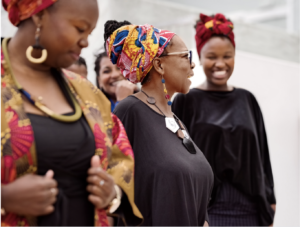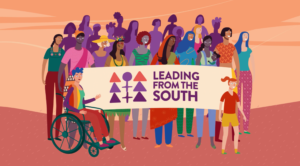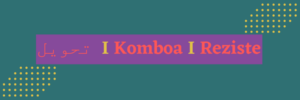Standing Together: A Call for Action to End Violence Against Women in Africa

On November 25, the African Women’s Development Fund (AWDF) joins the world in observing the International Day for the Elimination of Violence Against Women commemorated under the theme UNiTE! Invest to Prevent Violence Against Women & Girls! This day which marks the beginning of the Sixteen Days of Activism against Gender Based Violence, highlights the ongoing global crisis of gender-based violence (GBV), which continues to rise despite progress in advocacy and legal protections. AWDF believes that ending GBV requires more than legal reforms and protective measures—it demands a fundamental shift in societal attitudes toward women’s rights. From West Africa to the Horn of Africa, women-led movements are at the forefront of this struggle, but they need more than support—they need sustained, concrete action.
AWDF’s Commitment to Ending Sexual Violence in West Africa
Sexual violence remains a pervasive issue in West Africa. According to a UN Women report (2018), over 60% of women in the region have experienced physical or sexual violence, with many survivors facing barriers to justice due to weak legal frameworks, inadequate support services, and prevailing social norms that condone such violence.
AWDF’s commitment to ending sexual violence focuses on strengthening local responses, bolstering legal protections, and creating safer spaces for survivors. In partnership with the Ford Foundation, OSIWA, and other local organizations, AWDF has launched an initiative to address and prevent sexual violence across West Africa. This initiative strengthens the capacity of women’s rights organizations to provide direct services to survivors, advocate for stronger laws, and shift harmful cultural norms that perpetuate sexual violence.
Through the KASA Initiative, AWDF has supported organizations to train over 300 law enforcement officers and reached 10,000 community members with educational programs on preventing sexual violence. By supporting local actors and leveraging international funding, AWDF is addressing the root causes of sexual violence and ensuring stronger protections for women and girls.
Discover inspiring stories from the AWDF’s KASA program, supporting feminist initiatives across Africa, and a concerning article on the 196 reported cases of rape in Senegal in the first half of 2024, highlighting the urgent need to strengthen efforts against sexual violence.
Learn more about KASA grantee stories
Read an article on sexual violence in Senegal
Strengthening Community Resilience and Feminist Solidarity

Feminist movements across Africa have shown remarkable resilience in the face of growing attacks from anti-rights groups. Through initiatives, we continue to build stronger, more resilient communities that can withstand patriarchal violence.
One of AWDF’s key pillars is solidarity. As global threats to women’s rights increase, the strength of our collective response becomes more critical. Through alliances like the LFS Fund, we are fostering a culture of mutual support. These networks allow women’s rights organizations, activists, and survivors of violence to come together to heal, strategize, and take collective action.
In Uganda, for example, through the LFS Fund, AWDF has partnered with local women’s organizations to provide legal aid and psychosocial support to survivors of sexual violence. This partnership has enabled over 4,000 survivors to access justice and healing services, and it has helped local communities become more active in combating violence through community dialogues and public education campaigns.
Explore the powerful stories of LFS grantees supporting feminist activism in the Global South, and learn about five more years of funding to sustain and expand these critical movements.
The Growing Threat of Anti-Rights Movements

Across Africa, anti-rights movements are gaining momentum, threatening the rights of women and girls. From Uganda’s Anti-Homosexuality Act to recent rollbacks of sexual and reproductive health rights in Somalia, these regressive movements are a direct challenge to women’s rights. According to the UN Women’s Global Database on ViolenceAgainst Women, one in three women globally experiences physical or sexual violence in their lifetime, with African women facing some of the highest rates of sexual violence.
In Somalia, the repeal of the Sexual Offences Bill exemplifies the dangers posed by these movements. The bill, which sought to criminalize sexual violence, was a significant step forward in women’s rights. Its repeal has not only left women vulnerable to further violence but also highlights the vulnerability of legal protections in the face of regressive political agendas.
The Komboa Consortium, is Inspired by African feminist values of sisterhood, solidarity and mutual aid, the African Women’s Development Fund (AWDF), Initiative Sankofa d’Afrique de l’Ouest (ISDAO), Purposeful, Doria Feminist Fund, and Strategic Initiative for Women in the Horn of Africa (SIHA), have joined forces and resources to create Komboa (“Liberate” in Swahili) a feminist consortium that supports communities threatened by the rise of anti-rights and anti-gender movements.
Inspired by African feminist values of sisterhood, solidarity and mutual aid, the African Women’s Development Fund (AWDF), Initiative Sankofa d’Afrique de l’Ouest (ISDAO), Purposeful, Doria Feminist Fund, and Strategic Initiative for Women in the Horn of Africa (SIHA), have joined forces and resources to create Komboa (“Liberate” in Swahili) a feminist consortium that supports communities threatened by the rise of anti-rights and anti-gender movements.
The Role of International Advocacy and Accountability
AWDF recognizes that international advocacy is crucial in shaping global norms around gender-based violence. By collaborating with regional and international actors, AWDF plays a critical role in resourcing and nurturing organizations that hold governments accountable for their commitments under international human rights frameworks, including the Convention on the Elimination of All Forms of Discrimination Against Women (CEDAW) and the Maputo Protocol. By providing financial support and capacity-building, AWDF empowers grassroots organizations to advocate for the full implementation of these human rights instruments, ensuring that governments are held responsible for advancing gender equality and women’s rights across the continent.
Through policy dialogues and advocacy campaigns, AWDF continues to pressure governments to ensure stronger legal frameworks that prevent and respond to gender-based violence. For example, after a two-year advocacy campaign led by AWDF and local partners, the Kenyan government passed the Sexual Offenses Act, which provides stronger protections for women and girls, including harsher penalties for sexual violence and clearer guidelines for survivor support.
A Call to Action
On this International Day for the Elimination of Violence Against Women, AWDF calls on governments, civil society, and individuals across Africa and beyond to unite in the fight against violence. We urge continued investments in women’s rights organizations, especially those led by women in marginalized communities, and call on each individual to actively participate in ending gender-based violence. Whether through advocacy, education, or direct support for survivors, every action counts.
Let us come together to build a future where women and girls are safe, respected, and able to live free from fear of violence—today, tomorrow, and for generations to come.
Bintou Mariam Traoré, communications Officer
